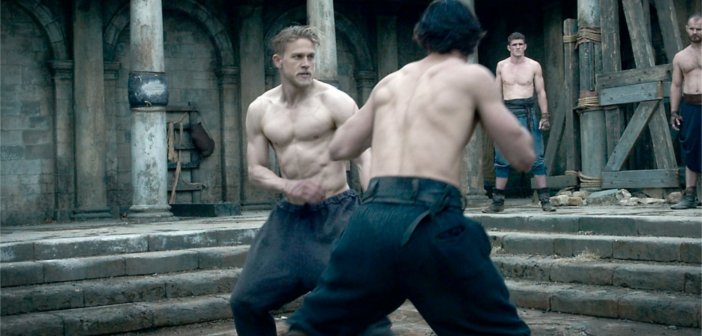Film Review | King Arthur: Legend of the Sword Swings and Misses
There’s an oft-repeated parable that posits that, for certain artists, the fruits of success supersede artistic integrity. It was only after enjoying all the cash that fame had to offer could, say, a group like Oasis go on to create something that was worthwhile. The more I think about it, the more such an idea could be applied to Guy Ritchie: Emerging in the late nineties as a laddish alternative to then up and coming creators like Lynne Ramsey and Christopher Nolan — a kind of auteur for the FHM crowd — Ritchie’s style-over-substance shtick was running off empty fumes by the time he got around to 2005’s navel gazing dross, Revolver. Ritchie then re-invented himself, possibly taking cues from his former beau Madonna, as being somebody who could breathe life into big-budget studio films. Following one very good Sherlock Holmes film (the less said about the second the better), and a criminally underrated Man from U.N.C.L.E. reboot, a King Arthur rehash should naturally be Ritchie’s crowning achievement.
In a muddled opening sequence, a curiously American sounding Uther Pendragon (Eric Bana) swaddles his only son, Arthur, in a basket of reeds and sends him down river. He does so in order to protect his child from a coup led by evil younger brother Vortigern, played by Jude Law. The film does a poor job of explaining any of what’s happening on screen, and from then on its problems only get worse. Baby Arthur is subsequently taken in by some prostitutes, and in the film’s most hilarious montage, he goes from being a child, to a preteen, to a teen, to hulking Charlie Hunnam over the course of a few frames.

The film then calms down and moves into familiar Ritchie patter. Arthur preambles around a Dark Ages-era London, encountering geezery characters like “Kosher Mike” and “Kung Fu George”, and playing through a number of fast-paced action sequences that play to Ritchie’s kinetic editing strengths. The blokey language is, it goes without saying, completely at odds with the movie’s period setting, and this lends an enjoyably parodic feel to the proceedings, although it feels more Carry On than Holy Grail. It’s when the movie gets around the whole ‘sword in the stone’ business that things take a painful nosedive. If making big budget studio films is a kind of Faustian pact of sorts, then it is here that Satan comes to collect.
The paradox that is inherent in Guy Ritchie attempting to make a franchise film is that, eventually, his own personality as a director is going to be superseded by the studio’s need to set up the next installment (there will be six, allegedly, in this case). As soon as King Arthur starts to do this, the film collapses into a mess more incoherent than the most ancient of olde English tapestries. That first montage proves to be the least messy in the movie. In fact there’s so many montages in the film that I had a sinking suspicion it was the movie’s way of trying to distract from what was actually happening underneath the surface (which is to say, not much). By the time the CGI climax roles around I had generally lost patience with it, as I’m quite certain most people will.
With the popularity of Game of Thrones, I don’t doubt that Guy Ritchie could have done something interesting with swords and sorcery material. Indeed, the King Arthur myth is ripe for a big budget retelling, and it’s all too familiar a tale that studio interference turned this into a muddled mess. If one good thing can be drawn from this, I guess it’s that if studios are plumbing this far for franchise material, a revolution of sorts must surely be imminent.
King Arthur: Legend of the Sword is in cinemas now. View the trailer below.
[arve url=”https://www.youtube.com/watch?v=jIM4-HLtUM0" align=”center” maxwidth=”750"]

